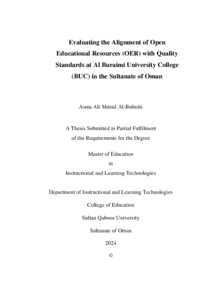Document
Evaluating the alignment of open educational resources (OER) with quality standards at Al Buraimi University College (BUC) in the Sultanate of Oman.
Source
Master's thesis
Other titles
تقييم توافق المصادر التعليمية المفتوحة مع معايير الجودة في كلية البريمي الجامعية في سلطنة عمان
Country
Oman
City
Muscat
Publisher
Sultan Qaboos University
Gregorian
2024
Language
English
Subject
Thesis Type
Master's thesis
English abstract
Implementing Quality Assurance (QA) in academic settings enhances
educational standards, which is crucial for program and institutional
accreditation. Accreditation agencies, such as the Oman Academic
Accreditation Authority (OAAA), have established evaluation criteria covering
the entire spectrum of higher education institutions (HEIs) activities, including
Open Educational Resources (OER). Over two decades, the evolution of open
educational resources (OER) has significantly impacted teaching and learning
globally. However, the use of OER, especially in online resources, often lacks
QA standards, impacting student learning objectives (SLOs) and overall
outcomes. This research investigated the perceptions of Al Buraimi University
College (BUC) instructors toward aligning OER with the established QA
criteria (Accuracy and Relevance, Production Quality, Accessibility,
Interactivity, and Licensing). The study also explored the interrelationships of
the five suggested QA criteria within BUC’s OER selection process, evaluating
the current OER selection process at BUC and identifying areas of improvement
and potential quality concerns, particularly in relation to the suggested QA
criteria.
The study followed a mixed methods research design that integrated
quantitative and qualitative data analytic procedures. A questionnaire was used
to collect the quantitative data, and documents utilized by BUC instructors were
analyzed to determine their alignment with QA standards. The sample consisted
of (n=55) instructors from different departments selected randomly from BUC.
The study findings showed that although BUC teachers agreed on matching
Open Educational Resources (OER) to the established Quality Assurance (QA)
criteria, they showed a lack of awareness and understanding of OER quality
standards when selecting OER. The analysis of OER through the adapted QA
framework identified strengths and drawbacks in meeting predetermined
standards. The study’s results suggested the necessity of a comprehensive
approach to OER implementation at BUC. The development of QA
frameworks, faculty training, resource design and selection, and continuing
support should all be prioritized in this strategy. Moreover, the study presented
further implications, recommendations, and suggestions for future research.
Arabic abstract
يؤدي تطبيق ضمان الجودة (QA (في الاوساط الاكاديمية إلى تعزيز المعايير التعليمية، وهو أمر بالغ الاهمية لاعتماد البرامج والمؤسسات التعليمية؛ ولقد ضعت وكالات الاعتماد مثل الهيئة العمانية للاعتماد الاكاديمي (OAAA (معايير تقييم تغطي كامل نطاق أنشطة مؤسسات التعليم العالي، بما في ذلك الموارد التعليمية المفتوحة؛ وعلى مدار عقدين من الزمن، أثر تطور الموارد التعليمية المفتوحة (OER (بشكل كبير على التدريس والتعلم على مستوى العالم؛ ومع ذلك، افتقرت الكثير من هذا الموارد التعليمية وخاصة الموارد التعليمية عبر الانترنت غالبًا ما إلى معايير ضمان الجودة، مما قد يؤثر على أهداف تعلم الطالب (SLOs (والنتائج الاجمالية للعلملية التعليمية’ لهذا جاء هذا البحث لقياس آرء وتصورات الاكاديميين في كلية البريمي الجامعية تجاه مواءمة الموارد التعليمية المفتوحة مع معايير ضمان الجودة )الدقة والمالءمة وجودة الانتاج وإمكانية الوصول والتفاعل والترخيص(، كما درس البحث أي ًضا العالقات المتبادلة بين معايير ضمان الجودة الخمسة المقترحة وعملية اختيار الموارد التعليمية المفتوحة في الكلية، وتقييم عملية الاختيار الحالية وتحديد مجالات للتحسين المحتملة، ال سيما فيما يتعلق بمعايير ضمان الجودة المقترحة. اتبعت الدراسة تصمي ًما بحثيًا مختل لنوعية، حيث ًطا يجمع بين إجراءات تحليل البيانات الكمية وتم استخدام الاستبيان لجمع البيانات الكمية، وتم تحليل الوثائق المستخدمة من قبل الاكاديميين بالكلية لتحديد مدى توافقها مع معايير ضمان الجودة؛ فقد تكونت العينة من )55( محاضرا من أقسام مختلفة تم اختيارهم عشوائيا لرغم من ً من الكلية؛ لقد أظهرت نتائج الدراسة أنه على ا موافقة الاكاديميين على مطابقة الموارد التعليمية المفتوحة مع معايير ضمان الجودة، الا أنهم أظهروا نق ًصا في الوعي والفهم لمعايير جودة الموارد التعليمية المفتوحة عند اختيار هذه الموارد التعليمية؛ ولقد حدد تحليل الموارد التعليمية المفتوحة إلى مجموعة من نقاط القوة والعيوب في تلبية المعايير المحددة في الدراسة؛ كما أشارت نتائج الدراسة إلى ضرورة اتباع نهج شامل لتنفيذ الموارد التعليمية المفتوحة في الكلية، وينبغي إعطاء الاولوية لتطوير أطر ضمان الجودة، وتدريب أعضاء هيئة التدريس، وتصميم الموارد واختيارها، والدعم المستمر في هذه الاستراتيجية؛ عالوة على ذلك، قدمت الدراسة المزيد من التوصيات والمقترحات لعمل دراسات مستقبلية في هذا المجال.
Category
Theses and Dissertations

